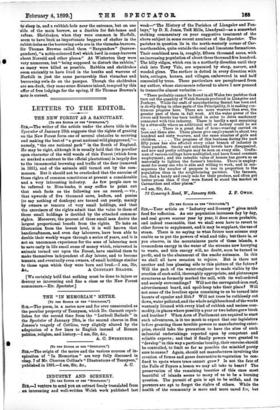LETTERS TO THE EDITOR.
THE NEW FOREST AS A SANCTUARY.
[To THE EDITOR OF THE " SPECTATOR...] SIR,—The writer of the article ender the above title in the Spectator of January 28th suggests that the rights of grazing on the New Forest form one of several obstacles to securing and making the best of " a great national wild playground,"— namely, "the one national park" in the South of England. He may be right, although it is usually held that the peculiar open character of the wild woods of this Forest (which form so marked a contrast to the official plantations) is largely due to the immemorial browsing and traffic of the deer (removed in 1851), and of the animals still turned out by the com- moners. But it should not be overlooked that the exercise of these rights of common constitutes at present a considerable and a very interesting industry. As few people care to be referred to Blue-books, it may suffice to point out that such facts as the following are on record, — viz , that upwards of five thousand cows, heifers, and ponies (to say nothing of donkeys) are turned out yearly, mainly by owners or tenants of very small holdings, and that the exercisers of the rights admit that the value to them of these small holdings is doubled by the attached common- rights. Moreover, the poorest of these small men derive the largest proportional benefit from the rights. To take an illustration from the lowest level, it is well known that handicraftsmen, and even day labourers, have been able to double their weekly wages through a series of years, and it is not an uncommon experience for the sons of labouring men to save early in life small sums of money which, reinvested in animals turned out upon the Forest, have enabled them to make themselves independent of .day labour, and to become tenants, and eventually even owners, of small holdings similar to those upon which they were born and bred.—I am, Sir,
[We certainly hold that nothing must be done to injure or destroy so interesting and fine a class as the New Forest commoners.—ED. Spectator.]


































 Previous page
Previous page